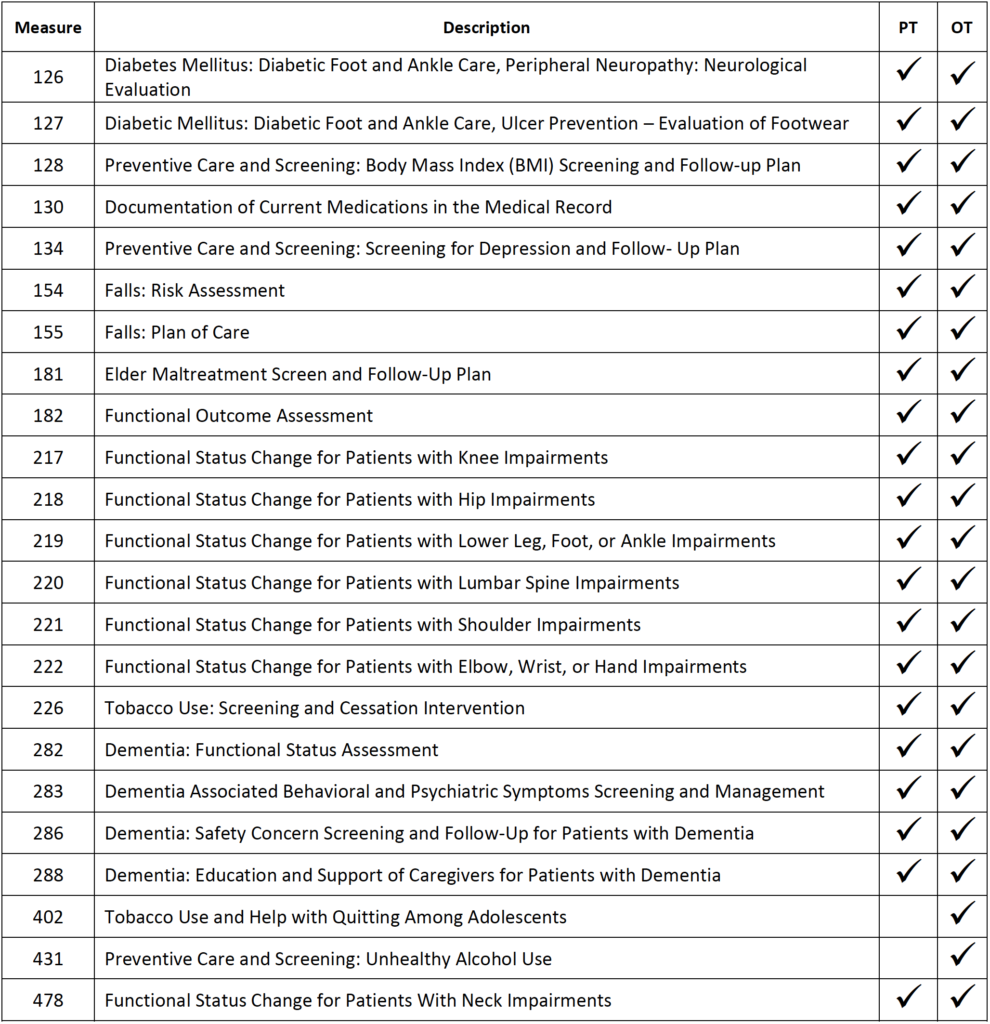MEDICARE PHYSICIAN FEE SCHEDULE FINAL RULE
CMS released the 2021 Medicare Physician Fee Schedule final rule on December 1, 2020 which, despite pressure from healthcare providers and members of Congress, included a 10.2% decrease from the 2020 conversion factor. In addition, CMS finalized adjustments to the RVUs for several CPT codes commonly used by therapy providers including:
- Increased work and practice expense RVUs for physical therapy evaluations (97161 – 97163).
- Increased work RVUs and decreased practice expense values for occupational therapy evaluations (97165 – 97167).
- Increased practice expense RVUs for neuromuscular reeducation (97112) and therapeutic activities (97530).
CMS also made adjustments to several work, practice expense, and malpractice GPCIs. Taking into consideration the adjustments to the conversion factor and RVUs, the overall impact to therapy providers was estimated to be roughly -9%, depending on the discipline (PT/OT), locality, and ratio of therapy evaluations to procedure codes.
On December 21st, Congress passed legislation which reduced, but did not entirely eliminate, the scheduled cuts. In addition to the fee schedule adjustments, the legislation also extended the temporary suspension of the Medicare sequestration through March 31st, 2021 and extended the Work Geographic Index floor minimum of 1.000 until January 1st, 2024. CMS published the revised 2021 conversion factor (34.8931) as well as the updated RVU and GPCI files the week of January 4th. The final impact to therapy providers for 2021 has been estimated to be roughly -3.0% depending on the locality and billing practices of the provider, a considerable decrease from the -9% reduction originally included in the final rule.
Additional highlights from the 2021 MPFS Final Rule
- CMS finalized their proposal to have several CPT codes remain temporarily on the Medicare telehealth list through the end of the year in which the PHE for COVID-19 ends. These Category 3 services include:
97161 – 97168, 97110, 97112, 97116, 97535, 97750, 97755, 97760, 97761.
As a result, PTs, PTAs, OTs, and OTAs can provide outpatient therapy services delivered via telehealth and have those services reimbursed by the Medicare program during the PHE. However, despite the addition of these codes to the telehealth list on a Category 3 basis, PTs, OTs, PTAs, and OTAs will NOT be eligible to furnish and bill for telehealth services through the end of a calendar year should the PHE end before then. Even with these codes added to this list on a temporary basis, during the time between the end of the PHE and the remainder of the calendar year in which the PHE ends, telehealth services can only be furnished by a therapist if billed incident to the professional services of a physician or practitioner who is authorized to furnish and bill for telehealth services, provided that the “incident to” requirements are met. - CMS finalized their proposal to allow direct supervision of an assistant by a therapist to be provided using real-time, interactive audio and video technology through the later of the end of the calendar year in which the PHE ends or December 31, 2021. The requirement could be met by the supervising therapist being immediately available to engage via audio/video technology (excluding audio-only) and would not require real-time presence or observation of the service via interactive audio and video technology throughout the performance of the procedure. This provision will allow a PTA or OTA to treat a Medicare Part B beneficiary in a private practice setting without the PT or OT onsite to provide direct supervision. The therapist would just need to be available via audio/video technology.
- The final rule makes permanent CMS’s Part B policy for maintenance therapy services that was adopted on an interim basis for the PHE which allows a physical or occupational therapist the discretion to delegate the performance of maintenance therapy services to a physical therapist assistant or an occupational therapy assistant, as clinically appropriate.
- CMS clarified that therapy students can document in the medical record so long as it is reviewed and verified (signed and dated) by the billing therapist.
- CMS also clarified that the broad policy principle allowing billing clinicians to review and verify documentation added to the medical record for their services by other members of the medical team also applies to therapists.
- The final rule includes several MIPS updates relevant to therapy providers including:
- A performance threshold of 60 points for the 2021 Performance Period
- Reweighting of the Promoting Interoperability and Cost performance categories for physical therapists, occupational therapists and speech-language pathologists for Performance Year 2021. Quality will again account for 85% of the overall MIPS score while Improvement Activities will account for 15%.
- Several measure updates relevant to physical and occupational therapists:
- Measure 226 is now available for reporting by PTs for encounters that include a PT evaluation.
- Measure 128 for registry reporting has been updated to include a new denominator exception code: G2181 – BMI not documented due to medical reason or patient refusal of height or weight measurement.
- Measure 130 for registry reporting has an updated description for the G8430 denominator exception.
- A full list of Quality measures that are applicable to PTs and OTs is included in the appendix below.
- While not originally included in the final rule, CMS did subsequently publish the KX modifier threshold levels for 2021. The annual threshold levels are $2,110 for PT and speech therapy combined and $2,110 for occupational therapy. The manual medical review threshold remains at $3,000.
NCCI EDITS
Over the course of the past year, CMS has implemented several additions, deletions, and reversals to the CCI edit list that have had an impact on therapy providers. Thankfully, the most recent changes that are effective as of 1/1/21 include some welcome deletions of code pair edits that have historically created reimbursement and denial issues, especially with commercial payors.
Of particular interest to therapy providers is the deletion of the edit for the 97140/97530 pairing as well as the deletion of the edits for 97140 when billed with any eval code (97161, 97162, 97163, 97165, 97166, and 97167). In addition, many of the edits associated with the re-evaluation codes (97164 and 97168) have been deleted including pairings with commonly used codes 97110, 97112, 97113, 97116, 97140, 97150, and 97530. However, not all of the edits associated with the re-evaluation codes were deleted. The -59 modifier will still need to be applied when re-evaluation codes are billed on the same date of service as several modality, wound care, and orthotic management codes.
IRG has once again updated its “-59 Modifier Quick Reference Guide” and distributed it to all clinics to assist clinicians as they navigate the latest round of edit updates. Providers can view the full list of CCI edits here.
PT COMPACT
Twenty states are currently issuing and accepting physical therapy compact privileges including Arizona, Arkansas, Colorado, Iowa, Kentucky, Louisiana, Mississippi, Missouri, Nebraska, New Hampshire, North Carolina, North Dakota, Oklahoma, Oregon, Tennessee, Texas, Utah, Virginia, Washington, and West Virginia.
Another nine states have enacted compact legislation but have yet to begin issuing or accepting compact privileges including Delaware, Georgia, Maryland, Montana, New Jersey, Pennsylvania, South Carolina, South Dakota, and Wisconsin.
APPENDIX
Applicable 2021 Registry Quality Measures for PTs and OTs

